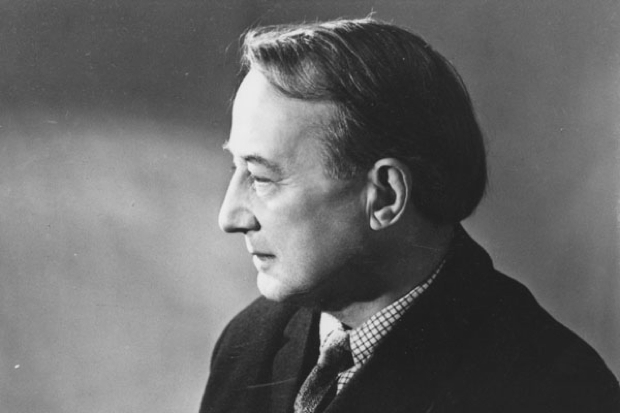Spectator readers of my vintage will remember their first encounter with Beckett as vividly as their first lover’s kiss. For me they happened around the same time, aged 18. The dramatic initiation was a Colchester rep performance of Waiting for Godot, in 1956.
Twenty-five years after his first mature work was written Beckett had hit England with the burst of an unexploded wartime bomb. The general response at the time was one of fascinated bafflement. That has dispersed over the last half century but the fascination — as the headlines accompanying the publication of this Beckettian fragment witness — remains undiminished.
The story, ‘Echo’s Bones’, is an early work but in no sense juvenile. The package Faber offers us has, internally, the dimensions of a transport-caff sandwich: 23 pages of prefatory material, 48 pages of text, 69 pages of end-notes. It would be easy to sneer— all caboose, no engine. But that would be unfair. The apparatus criticus is, most readers will discover, wholly necessary.
The background to the publication is itself a fascinating story. In 1933 Charles Prentice (a name to inscribe on the Beckett honour board) persuaded his firm, Chatto & Windus, to take on a volume of Beckett short stories — More Pricks than Kicks — on the basis that for a wholly uninitiated readership this young author was best administered in teaspoon doses.
Beckett’s ten stories were judged a trifle too short and he was asked for a makeweight ‘fagpiece’, as Beckett called it. The fag-end he came up with was ‘Echo’s Bones’. It was too Beckettian for 1933 and, as Prentice candidly confessed, gave the firm the ‘jim-jams’. It was politely rejected and binned by Beckett. Eighty years on it has risen from the bin.
One can see Chatto’s point. Beckett was evolving fruit-fly fast and had embarked, with ‘Echo’s Bones’, on a new technique. He resolved to inject the whole bulk of his extraordinarily wide reading, scholarship, and vocabulary into the skeletal frame of a short story. The result is a compressed riot of intertextuality, allusion and cross-referentiality.
The title, as the first of the endnotes usefully informs us, is from Ovid’s Metamorphoses: ‘Echo’s bones were turned to stone. Her love for Narcissus unrequited, she pined away until only her voice and her bones remained,’ ‘Echo’s Bones’ is, as Beckett labelled it, a ‘triptych’. It opens with Belacqua, who died in an earlier story, returned to life, sitting, precariously, on a fence.
At this period of his life Beckett was suffused in Dante (Belacqua is a lutemaker in the Divine Comedy). But unlike the revenant Dante, who discovers a world larger than ours the other side of death, Belacqua has discovered only nothingness. In the vita nuova granted him he sits on his fence. The posture is ‘casse-poitrine’. As a note informs us, ‘the active partner in homosexual fellatio’.
As he perches, Belacqua smokes a phallic cigar and picks his nose. An endnote informs us that the allusion is to Jules Renard’s praise for ‘the solitude in which you can at last lovingly pick your nose’. Belacqua’s solitude is interrupted by a whore, named Zaborovna Privet. The Russian word ‘zabor’ means, a note tells us, ‘fence’, and ‘privet’, we need no note to tell us, is the ubiquitous English fencing bush.
With plentiful assistance of rum and garlic, Belacqua is raped by Zabora. The point, frequently encountered in Beckett, is that the only ‘resurrection’ we can expect is that return to libidinal life between the ‘little death’ of orgasm and the next killing orgasm.
The second panel of the triptych sees Belacqua, potent again, serving as an inseminator for Lord Gall of Wormwood, who is unable to produce the heir who will keep his lands in family possession. The third panel finds Belacqua sitting on his own gravestone watching a gravedigger rob his grave. Once opened the coffin reveals only stones — Echo’s remains in Ovid.
Mark Nixon’s edition is a glorious vindication of scholarship. The notes — two pages for every page of Beckett text — enrich the story with reference which will surely escape the common reader. This density of explication would not be required in Beckett’s later work as he progressed from the plenitude of this story to the parsimony of, say, Krapp’s Last Tape. But for ‘Echo’s Bones’ the endnotes are a literary lifesaver.
One closes this little book with a spasm of regret that Beckett did not live to see the origin of the universe recently discovered in — what else? — echoes: those mysterious gravitational waves, last faintly resounding relics of the Big Bang. The image would have pleased him mightily.
Got something to add? Join the discussion and comment below.
Get 10 issues for just $10
Subscribe to The Spectator Australia today for the next 10 magazine issues, plus full online access, for just $10.
Available from the Spectator Bookshop, £17. Tel: 08430 600033
You might disagree with half of it, but you’ll enjoy reading all of it. Try your first month for free, then just $2 a week for the remainder of your first year.














Comments
Don't miss out
Join the conversation with other Spectator Australia readers. Subscribe to leave a comment.
SUBSCRIBEAlready a subscriber? Log in